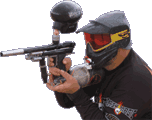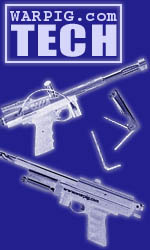  |
|
|
|
|
|
|
  |
|
|
|
|
|
|

Product Testing performed with DraXxus Paintballs
What
do you think?
|
Tippmann X7 Features HowItWorks Disassembly Adjustment Testing Data
Testing of the X7 was performed for both general operation, in which no unexpected problems came to light, and objective testing was done to determine velocity consistency, and compare shot grouping size with the stock barrel to that with a standardized test barrel.
To test for velocity consistency and shoot-down, the X7 was adjusted to fire at approximately 258 feet per second, then 30 shot strings were fired over a recording chronograph at rates of both 1bps and 12 bps.
At a steady 1 bps, the X7 had an average velocity of 284.6 feet per second with a standard deviation of 4.6. The 95% figure – a quantification based on throwing out 5% of the data which is the least consistent (this allows for odd, inconsistent paint to be discounted) was at ±2.0. When the rate of fire increased, for a 30 shot string at 12 bps, the average velocity dropped only slightly to 283.6. While the extreme spread (difference between the slowest and fastest shots) jumped to 25 fps, pushing the standard deviation up to 5.8, the 95% figure, rated the velocities at ±2.0 – meaning that aside from a couple of oddballs, consistency was comparable whether shooting slow or fast.
|
| Copyright © 1992-2019
Corinthian Media Services. WARPIG's webmasters can be reached through our feedback form. All articles and images are copyrighted and may not be redistributed without the written permission of their original creators and Corinthian Media Services. The WARPIG paintball page is a collection of information and pointers to sources from around the internet and other locations. As such, Corinthian Media Services makes no claims to the trustworthiness or reliability of said information. The information contained in, and referenced by WARPIG, should not be used as a substitute for safety information from trained professionals in the paintball industry. |